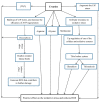Creatine Supplementation, Physical Exercise and Oxidative Stress Markers: A Review of the Mechanisms and Effectiveness
- PMID: 33800880
- PMCID: PMC8000194
- DOI: 10.3390/nu13030869
Creatine Supplementation, Physical Exercise and Oxidative Stress Markers: A Review of the Mechanisms and Effectiveness
Abstract
Oxidative stress is the result of an imbalance between the generation of reactive oxygen species (ROS) and their elimination by antioxidant mechanisms. ROS degrade biogenic substances such as deoxyribonucleic acid, lipids, and proteins, which in turn may lead to oxidative tissue damage. One of the physiological conditions currently associated with enhanced oxidative stress is exercise. Although a period of intense training may cause oxidative damage to muscle fibers, regular exercise helps increase the cells' ability to reduce the ROS over-accumulation. Regular moderate-intensity exercise has been shown to increase antioxidant defense. Endogenous antioxidants cannot completely prevent oxidative damage under the physiological and pathological conditions (intense exercise and exercise at altitude). These conditions may disturb the endogenous antioxidant balance and increase oxidative stress. In this case, the use of antioxidant supplements such as creatine can have positive effects on the antioxidant system. Creatine is made up of two essential amino acids, arginine and methionine, and one non-essential amino acid, glycine. The exact action mechanism of creatine as an antioxidant is not known. However, it has been shown to increase the activity of antioxidant enzymes and the capability to eliminate ROS and reactive nitrogen species (RNS). It seems that the antioxidant effects of creatine may be due to various mechanisms such as its indirect (i.e., increased or normalized cell energy status) and direct (i.e., maintaining mitochondrial integrity) mechanisms. Creatine supplement consumption may have a synergistic effect with training, but the intensity and duration of training can play an important role in the antioxidant activity. In this study, the researchers attempted to review the literature on the effects of creatine supplementation and physical exercise on oxidative stress.
Keywords: antioxidants; creatine supplementation; exercise; reactive oxygen species.
Conflict of interest statement
The authors declare no conflict of interest.
Figures



Similar articles
-
Vitamin C and E supplementation prevents some of the cellular adaptations to endurance-training in humans.Free Radic Biol Med. 2015 Dec;89:852-62. doi: 10.1016/j.freeradbiomed.2015.10.412. Epub 2015 Oct 19. Free Radic Biol Med. 2015. PMID: 26482865 Clinical Trial.
-
Effect of astaxanthin supplementation on muscle damage and oxidative stress markers in elite young soccer players.J Sports Med Phys Fitness. 2012 Aug;52(4):382-92. J Sports Med Phys Fitness. 2012. PMID: 22828460 Clinical Trial.
-
The role of oxidative, inflammatory and neuroendocrinological systems during exercise stress in athletes: implications of antioxidant supplementation on physiological adaptation during intensified physical training.Sports Med. 2015 Apr;45(4):453-71. doi: 10.1007/s40279-014-0282-7. Sports Med. 2015. PMID: 25398224 Review.
-
Antioxidant vitamin supplementation prevents oxidative stress but does not enhance performance in young football athletes.Nutrition. 2019 Jul-Aug;63-64:29-35. doi: 10.1016/j.nut.2019.01.007. Epub 2019 Jan 24. Nutrition. 2019. PMID: 30927644 Clinical Trial.
-
Dual Role of Reactive Oxygen Species in Muscle Function: Can Antioxidant Dietary Supplements Counteract Age-Related Sarcopenia?Int J Mol Sci. 2019 Aug 5;20(15):3815. doi: 10.3390/ijms20153815. Int J Mol Sci. 2019. PMID: 31387214 Free PMC article. Review.
Cited by
-
Amino acids regulating skeletal muscle metabolism: mechanisms of action, physical training dosage recommendations and adverse effects.Nutr Metab (Lond). 2024 Jul 2;21(1):41. doi: 10.1186/s12986-024-00820-0. Nutr Metab (Lond). 2024. PMID: 38956658 Free PMC article. Review.
-
Cellular Compartmentalization, Glutathione Transport and Its Relevance in Some Pathologies.Antioxidants (Basel). 2023 Mar 29;12(4):834. doi: 10.3390/antiox12040834. Antioxidants (Basel). 2023. PMID: 37107209 Free PMC article. Review.
-
Influence of N-Acetylcysteine Supplementation on Physical Performance and Laboratory Biomarkers in Adult Males: A Systematic Review of Controlled Trials.Nutrients. 2023 May 25;15(11):2463. doi: 10.3390/nu15112463. Nutrients. 2023. PMID: 37299425 Free PMC article.
-
Effects of different-intensity exercise and creatine supplementation on mitochondrial biogenesis and redox status in mice.Iran J Basic Med Sci. 2022 Aug;25(8):1009-1015. doi: 10.22038/IJBMS.2022.65047.14321. Iran J Basic Med Sci. 2022. PMID: 36159328 Free PMC article.
-
Anti-Inflammatory Activity of Pequi Oil (Caryocar brasiliense): A Systematic Review.Pharmaceuticals (Basel). 2023 Dec 21;17(1):11. doi: 10.3390/ph17010011. Pharmaceuticals (Basel). 2023. PMID: 38275996 Free PMC article. Review.
References
-
- Volek J.S., Ratamess N.A., Rubin M.R., French D.N., McGuigan M.M., Scheett T.P., Sharman M.J., Kraemer W.J. The effects of creatine supplementation on muscular performance and body composition responses to short-term resistance training overreaching. Graefe Arch. Clin. Exp. Ophthalmol. 2003;91:628–637. doi: 10.1007/s00421-003-1031-z. - DOI - PubMed
-
- Gama M.S. Efeitos da creatina sobre desempenho aeróbio: Uma revisão sistemática. Rev. Bras. Nutr. Esport. 2011;5:182–190.
-
- Pereira Junior M., Moraes A.J.P., Ornellas F.H., Gonçalves M.A., Liberalli R., Navarro F. Eficiência da suplementação de creatina no desempenho físico humano. Rev. Bras. Prescri. Fisiol. Exer. 2012;6:90–97.
Publication types
MeSH terms
Substances
Grants and funding
LinkOut - more resources
Full Text Sources
Other Literature Sources
Medical

